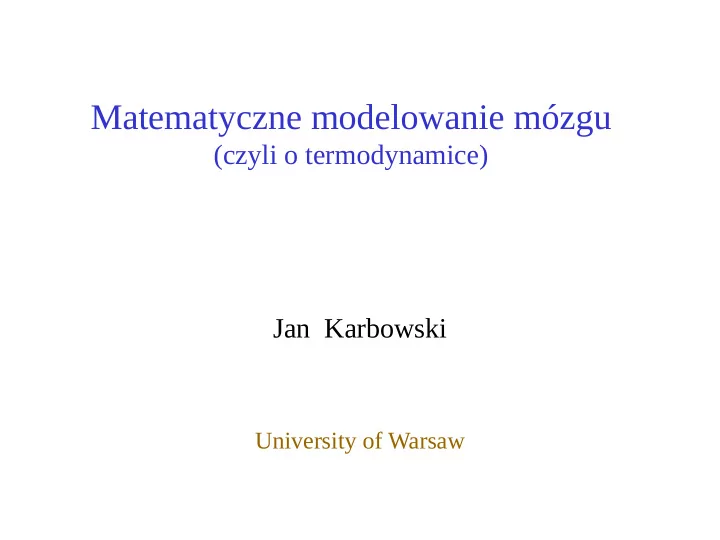

Matematyczne modelowanie mózgu (czyli o termodynamice) Jan Karbowski University of Warsaw
Brain sizes mouse rat human
Global brain metabolic scaling slope = 0.86 slope = 0.86 Brains are energy expensive: brain scaling exponent (slope) = 0.86 > 3/4 for whole body metabolism (Karbowski, (Karbowski, BMC Biol 2007) BMC Biol 2007).
Non-uniform brain activity pattern
Neural activation
Information transfer ≈ ion flows
Voltage and Na-K dynamics CS dV/dt = - g Na S(V-V Na ) - g K S(V-V K ) - g L S(V-V L ) - I p - I s UF d[Na]/dt = - g Na S(V-V Na ) - 3I p - αI s UF d[K]/dt = - g K S(V-V K ) + 2I p - βI s I p = AS [Na]³/([Na]³ + θ³) g Na = g Na,max m³ h, g K = g K,max n F – Faraday constant , U – neuron volume
Power generated by Na/K- ATP pumps P ATP = (N/T) ∫ dt ( - 3I p (V-V Na ) + 2I p (V-V K ) ) N – number of neurons in gray matter P ATP = NSA[Na] a ³ (3V Na - 2V K - V r ) / ([Na] a ³ + θ³)
Power generated – result (Karbowski – J. Comput. Neurosci. 2009) P ATP ~ (U g /d) (g Na,o + syn.cond. + f(C+δC)) For thin fibers (d→0) the power P ATP diverges and much heat is generated! Danger of brain overheating!
ATP, firing rate, and brain size
Heat removal from the brain • brain tissue conductance, • scalp conductance and radiation, • cerebral blood flow (deep in the brain)
Heat balance equation ρ br c br ∂T/∂t = κ ∂²T/∂r² - ρ bl c bl CBF(T-T bl ) + P ATP /U br T – brain tissue temperature κ – brain thermal conductance T bl – cerebral blood temperature r – spatial position usually T bl < T and thus blood flow removes heat
Dependence of brain temperature on firing rate and fiber diameter (human ) (mouse)
Conclusions ● Brains use more energy than other tissues in the body. ● Thermal properties of mammalian brains depend strongly on firing rates and axon diameter. ● Brains are safe from overheating (too thick axons).
Recommend
More recommend